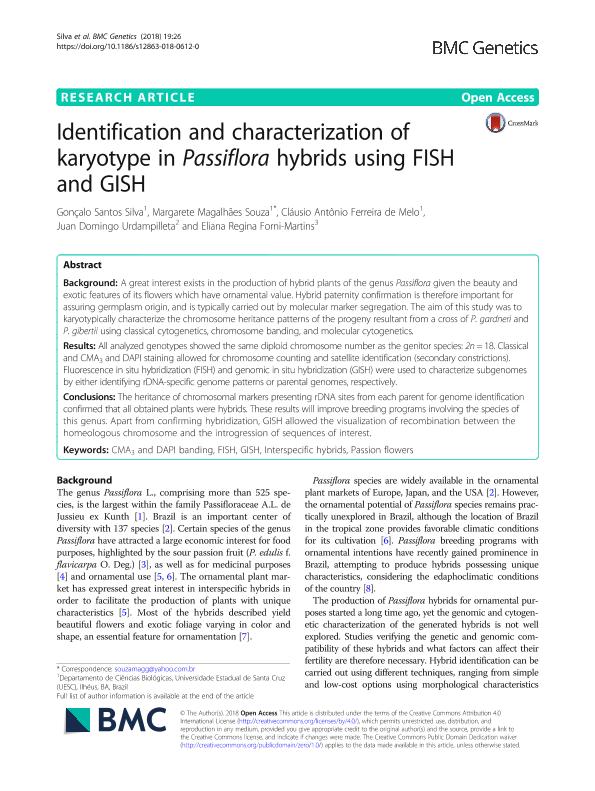Mostrar el registro sencillo del ítem
dc.contributor.author
Silva, Gonzalo Santos
dc.contributor.author
Souza, Margarete
dc.contributor.author
de Melo, Cláusio Antonio
dc.contributor.author
Urdampilleta, Juan Domingo

dc.contributor.author
Forni-Martins, Eliana Regina
dc.date.available
2019-10-21T12:31:29Z
dc.date.issued
2018-04
dc.identifier.citation
Silva, Gonzalo Santos; Souza, Margarete ; de Melo, Cláusio Antonio; Urdampilleta, Juan Domingo; Forni-Martins, Eliana Regina; Identification and characterization of karyotype in Passiflora hybrids using FISH and GISH; BioMed Central; BMC Genetics; 19; 1; 4-2018
dc.identifier.uri
http://hdl.handle.net/11336/86546
dc.description.abstract
A great interest exists in the production of hybrid plants of the genus Passiflora given the beauty and exotic features of its flowers which have ornamental value. Hybrid paternity confirmation is therefore important for assuring germplasm origin, and is typically carried out by molecular marker segregation. The aim of this study was to karyotypically characterize the chromosome heritance patterns of the progeny resultant from a cross of P. gardneri and P. gibertii using classical cytogenetics, chromosome banding, and molecular cytogenetics.ResultsAll analyzed genotypes showed the same diploid chromosome number as the genitor species: 2n = 18. Classical and CMA3 and DAPI staining allowed for chromosome counting and satellite identification (secondary constrictions). Fluorescence in situ hybridization (FISH) and genomic in situ hybridization (GISH) were used to characterize subgenomes by either identifying rDNA-specific genome patterns or parental genomes, respectively.ConclusionsThe heritance of chromosomal markers presenting rDNA sites from each parent for genome identification confirmed that all obtained plants were hybrids. These results will improve breeding programs involving the species of this genus. Apart from confirming hybridization, GISH allowed the visualization of recombination between the homeologous chromosome and the introgression of sequences of interest.
dc.format
application/pdf
dc.language.iso
eng
dc.publisher
BioMed Central

dc.rights
info:eu-repo/semantics/openAccess
dc.rights.uri
https://creativecommons.org/licenses/by-nc-sa/2.5/ar/
dc.subject
CMA3 AND DAPI BANDING
dc.subject
FISH
dc.subject
GISH
dc.subject
INTERSPECIFIC HYBRIDS
dc.subject
PASSION FLOWERS
dc.subject.classification
Ciencias de las Plantas, Botánica

dc.subject.classification
Ciencias Biológicas

dc.subject.classification
CIENCIAS NATURALES Y EXACTAS

dc.title
Identification and characterization of karyotype in Passiflora hybrids using FISH and GISH
dc.type
info:eu-repo/semantics/article
dc.type
info:ar-repo/semantics/artículo
dc.type
info:eu-repo/semantics/publishedVersion
dc.date.updated
2019-10-18T18:08:49Z
dc.identifier.eissn
1471-2156
dc.journal.volume
19
dc.journal.number
1
dc.journal.pais
Reino Unido

dc.journal.ciudad
Londres
dc.description.fil
Fil: Silva, Gonzalo Santos. Universidade Estadual de Santa Cruz; Brasil
dc.description.fil
Fil: Souza, Margarete. Universidade Estadual de Santa Cruz; Brasil
dc.description.fil
Fil: de Melo, Cláusio Antonio. Universidade Estadual de Santa Cruz; Brasil
dc.description.fil
Fil: Urdampilleta, Juan Domingo. Consejo Nacional de Investigaciones Científicas y Técnicas. Centro Científico Tecnológico Conicet - Córdoba. Instituto Multidisciplinario de Biología Vegetal. Universidad Nacional de Córdoba. Facultad de Ciencias Exactas Físicas y Naturales. Instituto Multidisciplinario de Biología Vegetal; Argentina
dc.description.fil
Fil: Forni-Martins, Eliana Regina. Universidade Estadual de Campinas; Brasil
dc.journal.title
BMC Genetics

dc.relation.alternativeid
info:eu-repo/semantics/altIdentifier/url/https://bmcgenet.biomedcentral.com/articles/10.1186/s12863-018-0612-0
dc.relation.alternativeid
info:eu-repo/semantics/altIdentifier/doi/http://dx.doi.org/10.1186/s12863-018-0612-0
Archivos asociados
